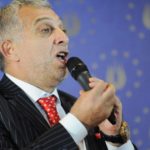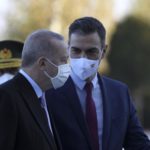Kurdish-led forces in charge of jails in north-east Syria housing about 10,000 men with alleged links to Islamic State are releasing prisoners in exchange for money under a “reconciliation” scheme, according to interviews with two freed men and official documents.
Syrian men imprisoned without trial can pay an $8,000 (£6,000) fine to be freed, a copy of the release form shows.
As part of the deal, the released prisoners sign a declaration promising not to rejoin any armed organisations and to leave the parts of north and east Syria under control of the Kurdish-led Syrian Democratic Forces (SDF).
On their release, the two men the Guardian met – both of whom had fought with IS until the group’s so-called caliphate collapsed in March 2019 – were reunited with their wives and children, who were also freed from al-Hawl detention camp under the deal.
The families then travelled to Idlib province, which is run by rival Islamists, and crossed the border to Turkey. Both men are now living, they believe, under the radar of the authorities in the country they have made their new home. One says that he never bought into the IS ideology, and the other that he was initially attracted to the religious component but did not realise the group would grow to be so violent.
It is not known how many men have been able to buy their freedom in this manner, but the two released men estimated at least 10 people they knew from their time in Hasekeh prison had left in the same way since the reconciliation scheme was implemented in 2019.
About 8,000 Syrian and Iraqi men accused of being IS members, and 2,000 more foreigners who have not been repatriated by their home countries, are held in three overcrowded SDF-administered prisons in north-east Syria.
The SDF has pushed its western partners to set up an internationally recognised court system to ease the pressure on its prisons and sometimes agrees reconciliation deals with tribal leaders who vouch that the prisoners are not extremists and will return to their families.
An SDF spokesperson, Farhad Shami, denied that the document obtained by the Guardian, which the released men said they had signed, was official and said no such practice was taking place.
“SDF has previously freed some prisoners who had links with IS [through tribal reconciliation], however their hands were not stained by blood of innocent civilians and [they] didn’t do any crimes. They were either employees in IS-run offices or were forced to join IS,” he said.
“Those who have been freed are being monitored by security forces to make sure they don’t try to rejoin IS.”
The international anti-IS coalition said it could not comment. “The coalition does not control or operate detention facilities or IDP camps. These detention facilities and IDP camps are both operated only by the SDF in north-east Syria,” it said in an email.
The releases pose a significant security risk inside and outside Syria and raise the prospect that men who committed grave crimes will not face true justice.
Abu Jafar, who was released in March, was a security officer in IS-held Raqqa, where he worked for a branch notorious for punishing and executing local people who did not follow the group’s austere interpretation of Islam.
In addition to the $8,000 fine, Abu Jafar, who denies ever hurting anyone, paid another $22,000 in bribes to various SDF officials, money he raised by asking his wealthy family in nearby Tabqa to sell some of their properties. He claimed to have joined IS just to make money, but continues to refer to the group by its full name in Arabic, rather than the more commonly used derogatory term Daesh.
“You can choose to be in IS of your own free will, but leaving isn’t something you can control. The moment you leave, they consider you as kafir [unbeliever] and you have to die,” he said.
“I was arrested in Baghuz [IS’s last stronghold] after being injured in an airstrike and turning myself in with other fighters during a ceasefire in March 2019. They moved our families to the [detention] camps and moved us to the jail. For around two years, we were waiting for a court or something to clarify our destinies. After a point, we knew we had to find our own way to get out of that place.”
Abu Muhammad, from Deir ez-Zor, led a fighting unit in the battle against the SDF for the town of Kobani in 2014. He survived five years on the frontline, until he was also arrested in Baghuz in 2019, and released along with his family in January this year.
He described conditions in Hasekeh jail that amounted to torture and ill treatment, which the SDF has previously denied.
He said: “SDF guards used to hang us to the roof of investigations rooms to torture us, and leave us hungry and thirsty. They did the same thing that we did to the people we arrested when we were in charge as IS leaders. I really regret that now, but I can’t describe myself as a victim after everything I did.
“The releasing process wasn’t easy, but after contacting many SDF leaders my family was able to get me out of jail after paying $14,000 in bribes in addition to the official $8,000 to the SDF’s public finance department.”
The details the two men gave about how they left prison corresponds with a release document for a different man the Guardian was able to obtain from an SDF source. Both men said they had signed the same form.
It has become common knowledge in places such as Raqqa that local men with links to IS whose families can raise the funds are able to get their sons out of prison, but the development has been greeted with anger and anxiety from most of the city’s residents, who suffered some of the group’s worst atrocities.
“As Raqqa people, we believe that releasing those dangerous people is just a matter of money. The SDF doesn’t care about the crimes those people committed against us. It’s just a way for the SDF to gain more money,” said Mohab Nasser, a civil society activist.
Four years since IS was driven from Raqqa by the SDF and US air power, much of the city still lies in ruins and residents are beginning to lose hope that IS will ever face true justice.
Mahmoud, 24, lost his mother during the IS occupation. The militants executed her in a makeshift prison after accusing her of spying, and her body never returned to the family.
Seeing the people he blames for his mother’s death return to the city has frustrated him to the point he is now considering dealing with the problem himself.
“They accused my mother of being a spy for the coalition, but she didn’t even know how to use a mobile phone. Today we know who [the released IS members] are. Sometimes we see them in Raqqa’s streets, but without a real judicial system, we cannot prove that. One day, we will take our revenge into our own hands.”
By: Bethan McKernan and Hussam Hammoud
Source: The Guardian



